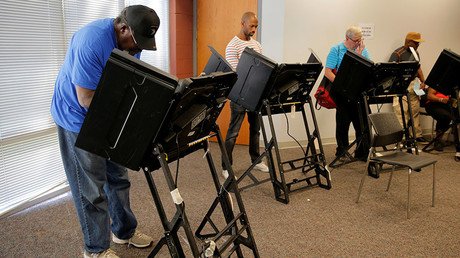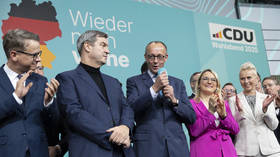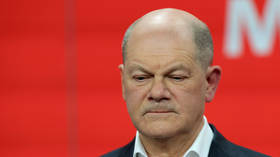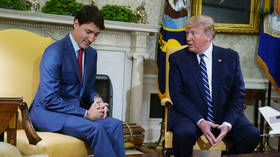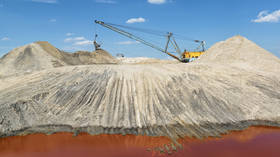61% of Americans don’t feel represented by either Democrats or Republicans
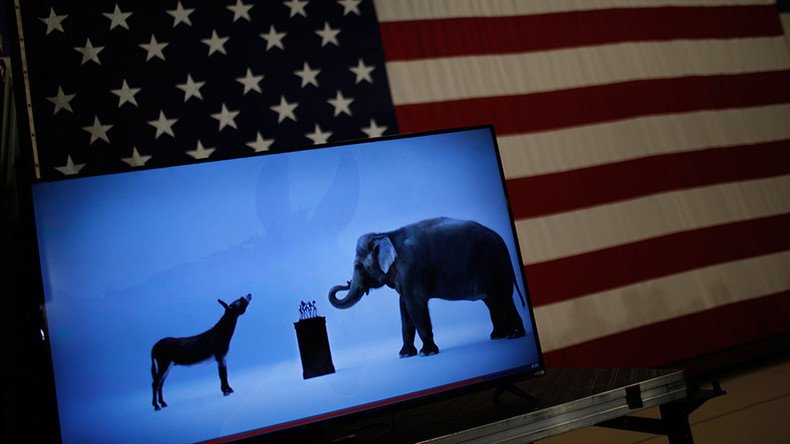
Despite the current US electoral landscape, which again sees a Democrat and a Republican leading the face off in the finals, more than six in 10 Americans who put them there do not feel represented by either party, a survey found.
The presidential election in 2016 has the entire country and world on the edge of their seats, as any hope of a third party candidate is all but gone. But according to the 2016 American Values Survey by the Public Religion Research Institute (PRRI), dissatisfaction with both parties has plummeted sharply since 1990.
And it’s not just parties: Americans don’t trust the electoral process as a whole, with only 43 percent believing their vote will be counted accurately. One in five people has shown a complete lack of confidence.
Likely voter support for Trump:
— PRRI (@PRRIpoll) October 25, 2016
36% All US
69% White evangelicals
33% Catholics
17% Unaffiliated#AVS2016https://t.co/FZCisD59hppic.twitter.com/4aY6FmqnD2
“Pessimism about the direction of the country is considerably higher today (74 percent) than it was at this time during the 2012 presidential race, when 57 percent of the public said the country was off on the wrong track,” the authors, who have tested 2,010 adults across 50 states, write.
One contributing factor that shook up people’s belief were things like outsider Donald Trump having success, and the popular Bernie Sanders, who lost his party’s nomination. This did not make life any easier for third-party candidates like the Libertarian Gary Johnson and Jill Stein of the Greens.
The resulting disappointment is thought to have contributed to 61 percent saying neither party reflects their views, with only 38 percent disagreeing.
The authors write that the views don’t change across class or race.
Yearning for another ‘Golden Age’?
Most of the people who support the firebrand Trump (72 percent) believe they’re doing so because life in the US has changed for the worse since the 1950s, while almost the same portion of those supporting Hillary Clinton believe things are actually looking up.
What is also a telling sign is that a slight majority of college-educated whites believe things have become better since that time, while nearly two-thirds of the white working class believe the opposite. The authors believe this testifies to just how pronounced class differences have become.
Since 1950s, has US culture mostly changed for better or for worse?
— PRRI (@PRRIpoll) October 25, 2016
51% Worse
48% Better#AVS2016https://t.co/FZCisD59hppic.twitter.com/ODB2srv9lP
The biggest pessimists in America are white evangelical Protestants, as nearly three-quarters (74 percent) say “American culture has changed for the worse since the 1950s.” But overall, the country is almost split on the matter, with 51 percent believing this aren’t looking as good as in the post-war golden age.
One thing everybody agrees on, however, is just how badly both the current candidates are doing. Less than half now view a major party candidate favorably, with Clinton taking 41 and Trump taking 33 percent in the poll.
And, as mentioned before, vote-counting confidence is a big issue. Here, Clinton supporters fair noticeably better, with 70 percent believing their votes will be counted accurately, compared to Trump’s 41 percent. This could be a result of how much importance each candidate or their party generally attributes to the issue.
“This election has become a referendum on competing visions of America’s future. Donald Trump supporters are nostalgic for the 1950s, an era when white Christians in particular had more political and cultural power in the country, while Hillary Clinton supporters are leaning into – and even celebrating – the big cultural transformations the country has experienced over the last few decades,” PRRI chief Robert P. Jones says.
But all of this is not to say that things have been steadily getting worse at the same rate. Outgoing President Barack Obama still enjoys one of the highest recent ratings among Democrats as the Number One president: 35 percent. That’s compared to John F. Kennedy, who had 21 percent, and Bill Clinton’s 20 percent. For Republicans, things appear to have ended with Reagan: nearly 69 percent of his constituents believe he was the best president ever. Although there’s a wild variation here, seeing as George W. Bush is next in line, and he has only 12 percent.
But mostly, everyone just wants the elections to be over: a startling majority (69 percent) recently told ABC News in a poll that they find the election stressful; of those 23 percent reported the period to be causing “serious stress.”
